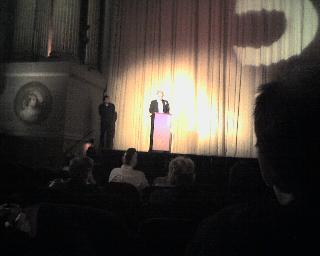Once is basically a musical, but not at all like Chicago or Dreamgirls. Well, except for that one word title thing.
The film opens with a man (Glen Hansard) playing a guitar on the street in some city that we later learn is Dublin, Ireland. His guitar is beat up and he’s mostly ignored, but he sings and plays well. We learn that his day job is fixing vacuum cleaners at his father’s vacuum repair shop. The female lead (newcomer Markéta Irglová) comes from Czechoslovakia, sells flowers on the street when she isn’t playing one of the pianos in a neighborhood music shop.
I hate to say much more about this film, because it mostly avoids the standard cliches, and even pointing out what those cliches might be would ruin the little surprises and the spontaneous flow of this wonderful little film. It’s a musical in the sense that the main characters play music and sing, and that moves the story forward, but not in the sense of characters breaking into song spontaneously and unbelievably as they would in a classic musical. So even if you don’t think you like musicals, you owe it to yourself to see this film. It won the audience award at the Sundance Film Festival, so it’s not just me saying that.
Note that it is rated R. As far as I can figure out, that’s due entirely to language, including a fair number of occurrences of the F-word. But it really seems tamer than many PG-13 or even PG films, so it would likely be safe for any teenager.
I should also mention that the camera is often shaky, so if you get motion sickness with SpastiCam™, you might want to sit further from the screen than usual. And the sound quality is not quite as good as you would want it to be, especially early in the film, though this did not bother me very much.
I saw the film at the Camera Cinema Club in Campbell, CA. There was a valiant attempt to get the filmmakers to the screening, but their schedule required them to leave the U.S. just a day or two prior. So instead there was a pre-recorded interview with the head of the Club with the writer/director and the two leads. Here are a few things I wrote down:
- Hansard is the lead singer with a band called The Frames, and he was also in The Commitments
- He played music on the street as young as 13, more for the experience that to make money (and in fact he said that on days when he actually did need money, he never made any)
- Irglová was only 17 years old when the film was made, although she pointed out that she was only one month shy of being 18
- She really does come from Czechoslovakia and met Hansard when she was 13
- Almost all of the songs were written by the stars
- The director calls the film an “art house musical” and compares it to the 1950’s version of A Star is Born
- Most of the shots are from far away, like from across the street, because the actors were uncomfortable with a camera in their faces; this likely contributed to the shaky camera
- The actor who robbed the male lead at the start of the film was actually attacked by bystanders since the camera was so far away they didn’t realize it was a movie being filmed
- The music came first, in the sense that the writer/director has followed Hansard’s music
- The script is not biographical, but pieces of the actors’ lives did inspire parts of it
- Irglová wishes she could write something to dance to instead of the depressing stuff (her words) that seems to come out
- The film was shot in about 13 days
I’ll give it a strong  out of
out of  . See it, and also buy the soundtrack.
. See it, and also buy the soundtrack.
Seen 5/20/2007.
 out of
out of 